The European Union is facing potential shocks from Trump’s trade policies, especially the threat of a universal tariff of up to 20% on all foreign-imported products. Trump believes that tariffs will benefit US businesses, create jobs, and reduce the federal deficit through extra tax revenues. However, critics warn that American consumers could end up bearing the economic burden, while European allies fear devastating consequences.
The EU-US trading relationship is significant, with around €1 trillion in goods and services exchanged annually. The EU benefits from a surplus in goods but faces a deficit in services. A blanket tariff of 10% or 20% could make it more expensive for American companies to import EU goods, leading to a significant drop in EU exports, particularly in sectors like machinery, vehicles, and chemicals. Germany, as a major exporter to the US, could be particularly vulnerable to such shocks.
Economists predict that Trump’s tariffs could deal a substantial blow to Europe’s economy, potentially pushing it towards a recession. Estimates suggest that a 10% tariff could lower the Eurozone’s GDP by 1% and significantly impact economies like Germany and Spain. Job losses could also occur due to the interdependence of transatlantic trade and investment. The EU has been strengthening its trade defence mechanisms in response to Trump’s previous tariffs.
There is a real risk that the EU could be drawn into a trade war, especially if Trump imposes steep tariffs on Chinese goods, leading to a redirection of products to the European market. This could escalate tensions between the EU and China, particularly as the EU has recently imposed tariffs on Chinese electric vehicles. The EU might try to negotiate with Trump to avoid retaliatory measures, as seen in previous agreements to buy American goods during his presidency.
The EU could seek an exemption from Trump’s tariffs through negotiation, offering concessions to prevent retaliatory measures. However, Trump’s economic advisors may also consider limiting the tariff ambitions to avoid economic turmoil at home. A spike in inflation could result from tariffs, and US importing firms could pass on the costs to American consumers. It remains uncertain how the EU will navigate the potential trade challenges posed by Trump’s policies in the coming years.










